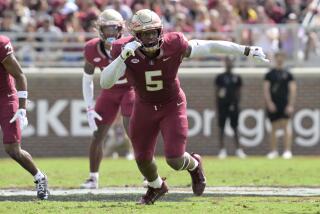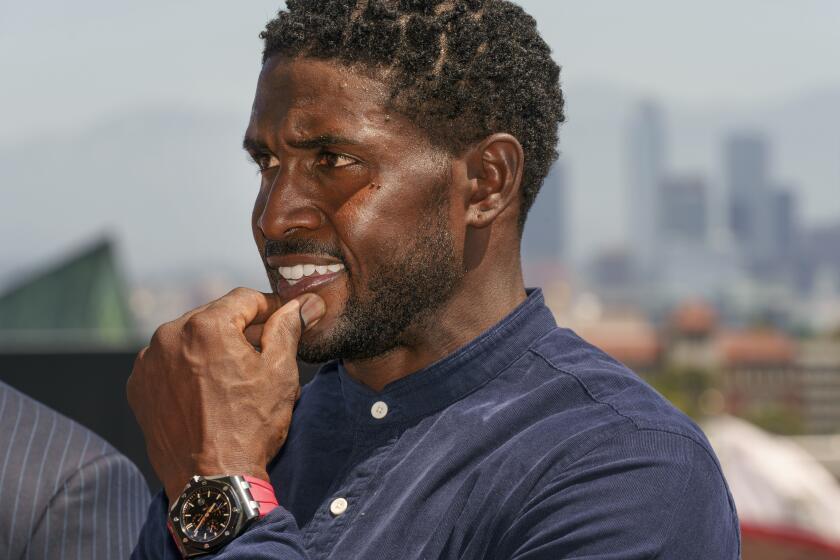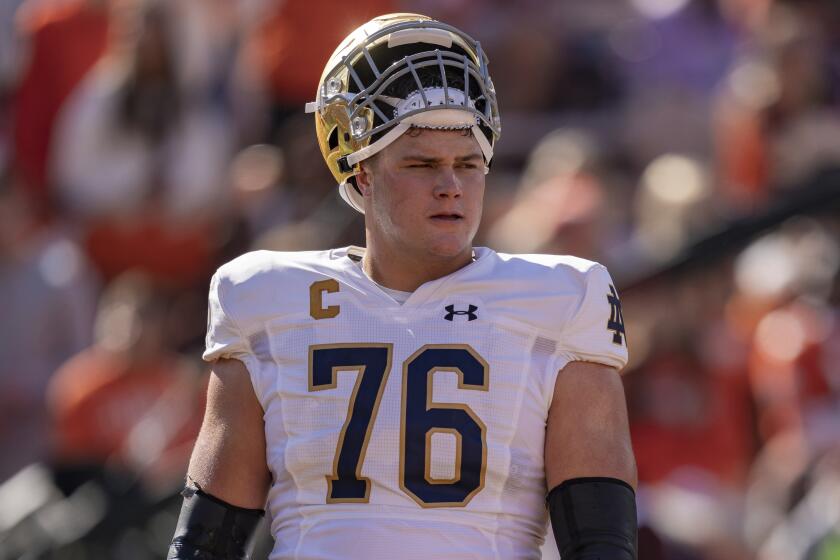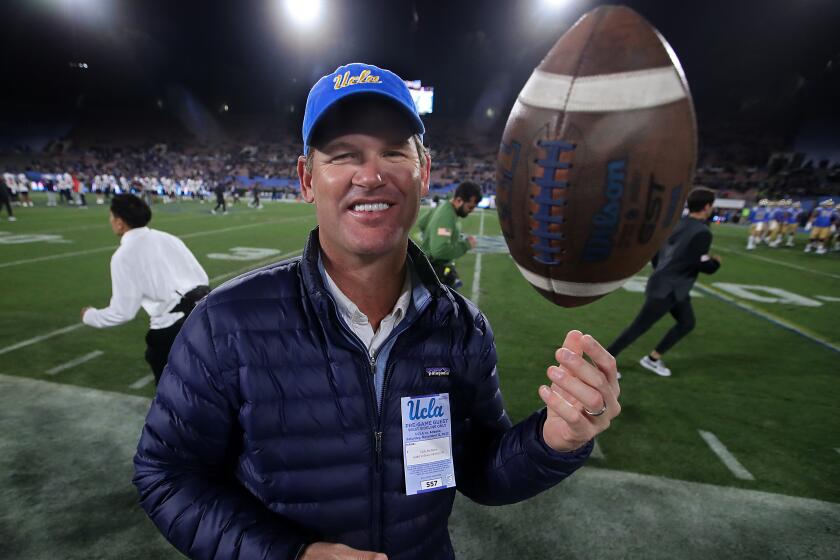Hootie and a Beast
In 1935, accompanied by his mother, 4-year-old William Woodward “Hootie” Johnson attended his first Masters tournament at Augusta National Golf Club. He was not wearing a green jacket.
It’s all different now -- the tournament, the course, the golf club -- just as anyone would expect with the passing of 71 years. As for Johnson, from his desk in the wood-paneled second-floor office at Augusta National, the seat of power for the most important tournament in golf has never seemed more secure.
No matter the situation. That green jacket never comes off, not when Johnson’s on duty.
Johnson doesn’t seek the spotlight, simply because that’s not what Augusta chairmen do, but chances are he won’t be able to avoid it this week. Johnson and the changes to the course during his administration are certain to be the talk of the golf world.
Some have already weighed in, such as Arnold Palmer and Jack Nicklaus, the tournament’s only six-time winner. Nicklaus recently told Golf Digest that the changes have “ruined” the course for the Masters.
Nicklaus said later that he understood the intentions at Augusta National, but that players who don’t drive the ball as well as the longer hitters were being shortchanged.
“Whether they’ve gone overboard, I’m not sure, but they’ve eliminated a lot of guys,” Nicklaus said.
As the Masters observes its 70th tournament beginning Thursday, Johnson’s reign as the fifth chairman since the club opened in 1934 has coincided with some of the biggest changes in its history, while at the same time reaching back in an effort to stay in touch with the past.
That’s the idea, anyway, said Johnson, one of the successors to Clifford Roberts, the first Augusta National chairman, who shared the concept for the club and the tournament with Bobby Jones. The only chairmen the club has had are Roberts, William H. Lane, Hord W. Hardin, Jackson T. Stephens and Johnson, who was elected by club members in 1998.
Since then, Johnson has overseen a major overhaul of the course. The biggest changes were in 1999, when rough was introduced; in 2002, when almost 300 yards were added and now, for this year, six more holes were made a total of 155 yards longer.
Since 1999, about 520 yards have been added to the course, which now measures 7,445 yards -- the second longest ever for a major championship.
Johnson said his predecessors would approve.
“I think Bobby Jones and Clifford Roberts would very much like Augusta National and the Masters as it is today,” he said in an e-mail. “We would not do many of the things we now do if we thought otherwise.”
It is his mandate, Johnson said, to preserve the integrity of the course in the face of technology that allows players to hit the ball farther than ever.
“We strive to keep the Masters special, maintain our traditions and remain current with the game of golf as it is today.”
Gary Player, 70, won at Augusta in 1961, 1974 and 1978. He will be playing in his 49th Masters. He said Nicklaus was entitled to his opinion.
Player has his own ideas.
“Look, I am the greatest believer in the technology of golf equipment, but all they’ve got to do is cut the ball back 40 yards and they’ve got it licked,” he said. “You don’t have to go messing around with the golf courses. All money that has been wasted. Augusta should be leading the way.
“Players right now, you can see guys hitting it 400 yards. Where are you going to put the tees in the future at Augusta? In the streets?
“The answer is not just to make the golf course longer, but put rough in there and make the greens hard. That will take care of everything forever. But it’s their golf course and they can do anything they like.”
Player said he was only offering an opinion.
“I never get indigestion from putting my foot in my mouth,” he said.
Under Johnson, there has been a steady diet of change, not always involving changes to the course. Three years ago, Johnson was embroiled in a dispute with Martha Burk, who was the leader of the National Council of Women’s Organizations, refusing her request that the club admit its first female member.
A protest demonstration was held near the club during the tournament, but there were more reporters than participants and the controversy eventually fizzled. There are still no female members at Augusta National.
Johnson angered some past champions such as Player, Billy Casper and Gay Brewer in 2002 when he sent letters to some of the older champions suggesting they no longer play. He also called for an age limit of 65 and also mandated that each Masters competitor play at least 15 sanctioned tournaments the previous year. He called off that plan after it came to light that Nicklaus and Palmer would no longer be eligible.
Johnson admitted he had made a mistake.
There also have been huge successes under Johnson. There is 18-hole coverage on CBS, the Masters has grown into an even more comfortable niche as the preeminent major and the tournament has raised more than $25.6 million for charity since he became chairman, including $3.4 million last year.
As for the series of alterations to Augusta National, Johnson is firm in the belief that the club is on the right track. He has local history to bolster his position.
Born in Augusta in 1931, the same year construction began on the course, Johnson started to play golf when he was 8, at nearby Augusta Country Club. His father was a banker and moved the family to Greenwood, S.C. A football player, Johnson was a fullback at South Carolina and at 25 was elected to the South Carolina legislature.
After his father died, Johnson became the youngest bank president in South Carolina at 34. Bankers Trust merged with one owned by Hugh McColl, the former chairman of BankAmerica, and NationsBank was formed. It merged with Bank of America in 1998. Johnson retired as chairman of NationsBank’s executive committee in 2001 after 15 years.
Johnson, who turned 75 in February, clearly remembers that first trip to the Masters. The 1946 Masters also stands out, he said, because he was watching with his future wife, Pierrine, and they saw Ben Hogan three-putt the final green to lose to Herman Keiser by one shot.
In this place, the past is never too far away, and Johnson’s legacy might still be under construction. What’s it going to be? Johnson said he patterned his job as chairman after the first one, Roberts.
He probably said it best, according to Johnson.
“Clifford Roberts remains an influence as well as my predecessor, Jack Stephens,” Johnson said. “Mr. Roberts was told once what a great tournament it was. And he said ‘Thank you, but we really get it right.’ We still feel that way.”
More to Read
Get our high school sports newsletter
Prep Rally is devoted to the SoCal high school sports experience, bringing you scores, stories and a behind-the-scenes look at what makes prep sports so popular.
You may occasionally receive promotional content from the Los Angeles Times.






